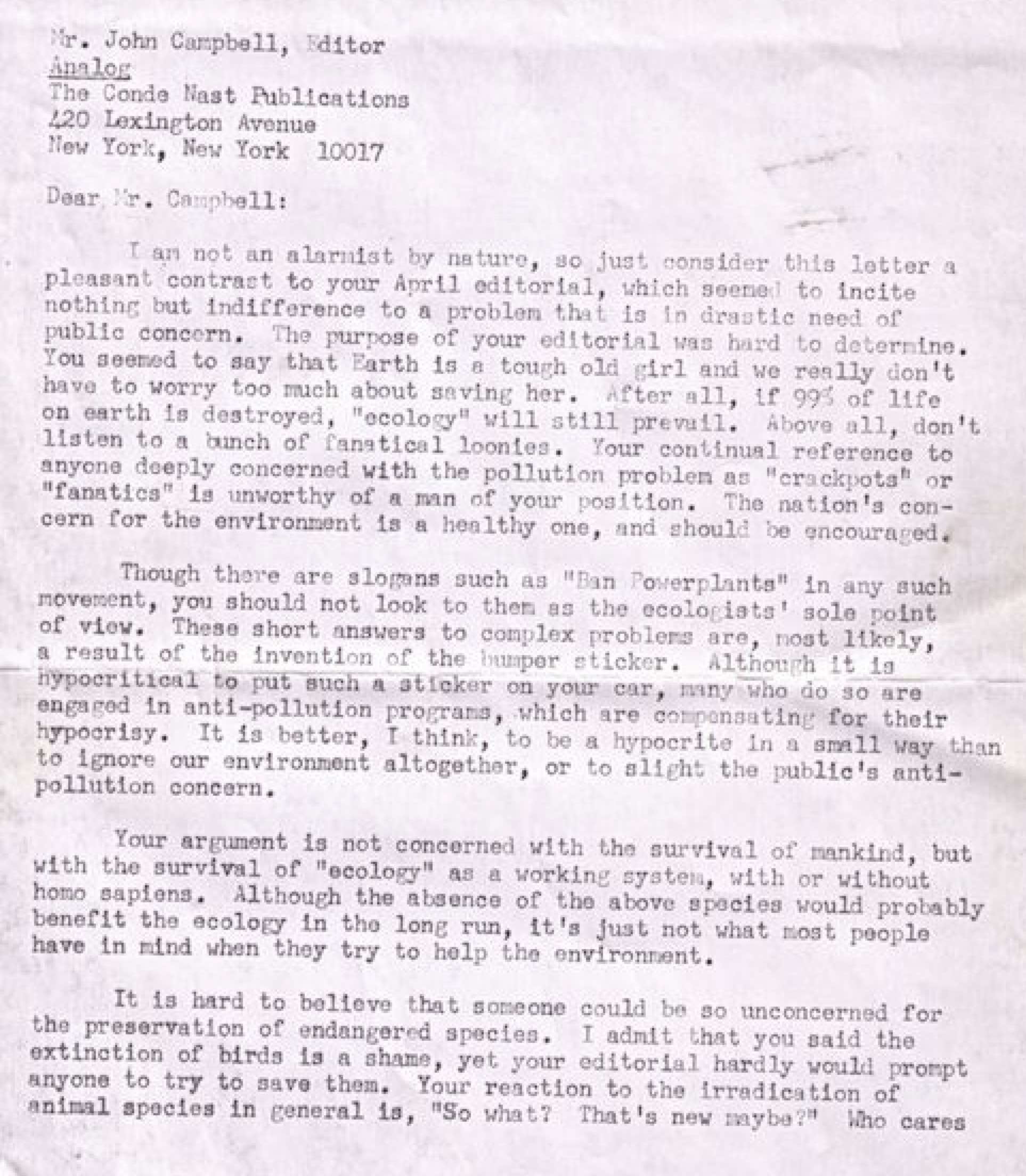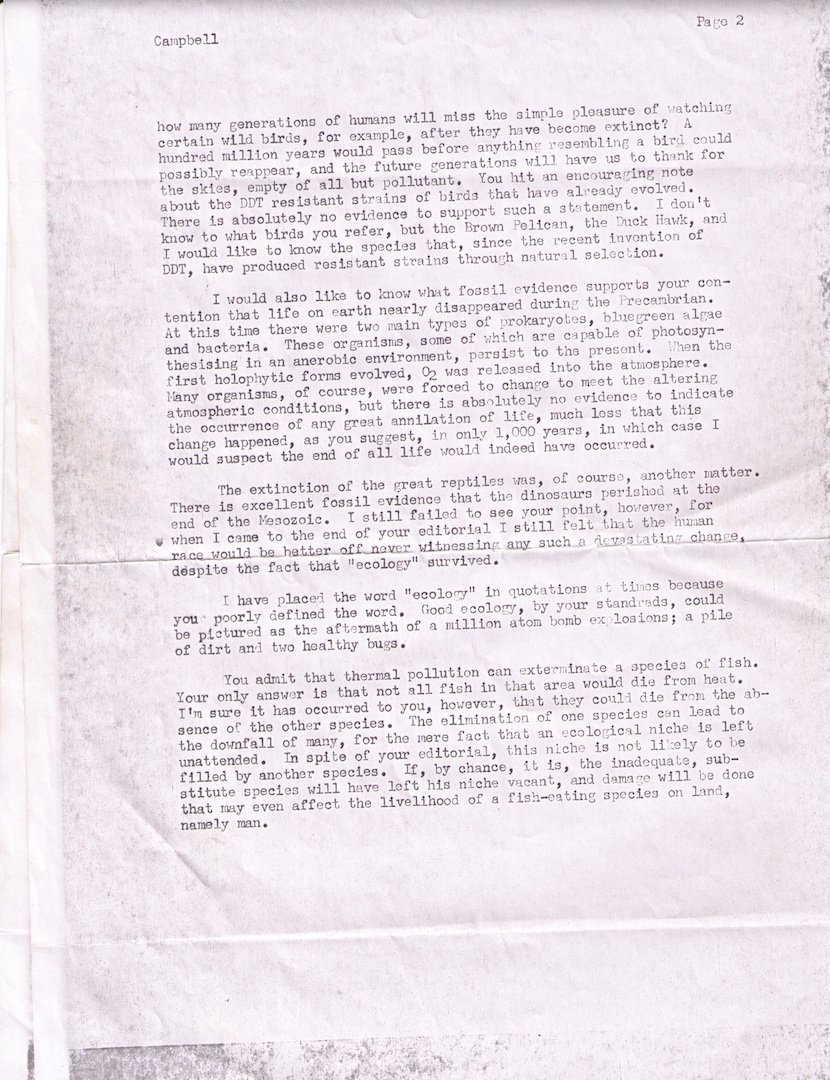Mr. John Campbell, Editor Analog The Conde Nast Publications
420 Lexington Avenue
New York, New York 10017
Dear Mr. Campbell:
I am not an alarmist by nature, so just consider this letter a pleasant contrast to your April editorial, which seemed to incite nothing but indifference to a problem that is in drastic need of public concern. The purpose of your editorial was hard to determine. You seemed to say that Earth is a tough old girl and we really don't have to worry too much about saving her. After all, if 99% of life is destroyed, "ecology" will still prevail. Above all, don't listen to a bunch of fanatical loonies. Your continual reference to anyone deeply concerned with the pollution problem as "crackpots" or "fanatics" is unworthy of a man of your position. The nation's concern for the environment is a healthy one, and should be encouraged.
Though there are slogans such as "Ban Powerplants" in any such movement, you should not look to them as the ecologist' sole point of view. These short answers to complex problems are, most likely, the result of the invention of the bumper sticker. Although it is hypocritical to put such a sticker on your car, many who do so are engaged in anti-pollution programs, which are compensating for their hypocrisy. It is better, I think, to be a hypocrite in a small way than to ignore our environment altogether, or to slight the public's anti-pollution concern.
Your argument is not concerned with the survival of mankind, but with the survival of "ecology" as a working system, with or without homo sapiens. Although the absence of the above species would probably benefit the ecology in the long run, it's just not what most people have in mind when they try to help the environment.
It is hard to believe that someone could be so unconcerned for the preservation of endangered species. I admit that you said the extinction of birds is a shame, yet your editorial hardly would prompt anyone to try to save them. Your reaction to the irradication of animal species in general is, "So what? That' new maybe?" Who cares how many generations of humans will miss the simple pleasure of watching certain wild birds, for example, after they have become extinct? A hundred million years would pass before anything resembling a bird could possibly reappear, and the future generations will have us to thank for the skies, empty of all but pollutant. You hit an encouraging note about the DDT resistant strains of birds that have already evolved. There is absolutely no evidence to support such a statement. I don't know to what birds you refer, but the Brown Pelican, The Duck Hawk, and I would like to know the species that, since the recent invention of DDT, have produced resistant strains through natural selection.
I would also like to know what fossil evidence supports you contention that life on earth nearly disappeared during the Precambrian. At this time there were two main types of prokaryotes, bluegreen algae and bacteria. These organism, some of which are capable of photosynthesising in an anerobic environment, persist to the present. When the first holophytic forms evolved, 02 was released into the atmosphere.s Many organisms, of course, were forced to change to meet the altering atmospheric conditions, but there is absolutely no evidence to indicate the occurrence of any great annilation of life, much less that this change happened, as you suggest, in only 1,000 years, in which case I would suspect the end of all life would indeed have occurred.
The extinction of the great reptiles was, of course, another matter. There is excellent fossil evidence that the dinosaurs perished at the end of the Mesozoic. I still failed to see your point, however, for when I came to the end of your editorial I still felt that the humans race would be better off never witnessing any such a devastating change, despite the fact that "ecology" survived.
I have placed the word "ecology" in quotations at times because you poorly defined the word. Good ecology, by your standrads, could be pictured as the aftermath of a million atom bomb explosions: a pile of dirt and two healthy bugs.
You admit that thermal pollution can exterminate a species of fish. Your only answer is that not all fish in that area would die from heat. I'm sure it has occurred to you, however, that they could die from the absence of the other species. The elimination of one species can lead to the downfall of many, for the mere fact that an ecological niche is left unattended. In spite of you editorial, this niche is not likely to be filled by another species. If, by chance, it is, the inadequate, substitute species will have left his niche vacant, and damage will be done that may even affect the livelihood of a fish eating species on land, namely man.
This is precisely the point many "fanatical" conservationists are trying to illustrate. We all had better hope that the next trivial and insignificant species exterminated doesn't turn out to be the ocean's phytoplankton, particularly diatoms, which, incidentally, supply us with about 70% of our oxygen. Much of this comes from artic water and, therefore, one might expect thermal pollution could endanger it. I don't, however, rule out the possibility that an oil tanker will put an end to photosynthesis in that productive area. In either case, the total collapse of all life would not be an unlikely result, though some anerobic organisms could still survive.
Sincerely,
(Signed)
Tom Cole



